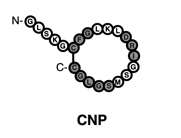- Vascular Disease
- Diabetes
- Skeletal Development
- Sepsis
- Renal Disease
- Clerico A et al. “Thirty years of the heart as an endocrine organ: physiological role and clinical utility of cardiac natriuretic hormones.” Am J Physiol Heart Circ Physiol 2011; 301: H12-H20.
- Hoffman et al. “Prognostic Value of Plasma N-Terminal Pro-Brain Natriuretic Peptide in Patients With Severe Sepsis.” Circulation; 2005:112:527-534.
- Koch, A. et al. “Prognostic value of circulating amino-terminal pro-C-type natriuretic peptide in critically ill patients.” Critical Care 2011, 15:R45 doi:10.1186/cc10007.
- Moro, Cedric et al. “Natriuretic Peptides: New Players in Energy Homeostasis.” Diabetes 2009; 12: 2726-2728
- Nazario, B et al. “Atrial and Brain Natriuretic Peptides Stimulate the Production and Secretion of C-type Natriuretic Peptide from Bovine Aortic Endothelial Cells.” Journal of Clinical Investigation 1995 Mar; 95(3): 1151–1157.
- Olney, Robert et al. “Amino-terminal propeptide of C-type natriuretic peptide (NTproCNP) predicts height velocity in healthy children.” Clin Endocrinol (Oxf). 2012 Sep; 77(3): 416–422.
- Schreibe, Donald et al. “Natriuretic Peptides in Congestive Heart Failure.” Medscape 2012: Jan 10.
- Suzuki, T et al. “The Role of the Natriuretic Peptides in the Cardiovascular System.” Cardiovascular Research 2001; 51: 489–494.


What
is CNP?
CNP stands for C-type natriuretic peptide and it is
derived from a preprohormone of 126 amino acids and a prohormone of 53 amino
acids. CNP was originally found in the
central nervous system in much greater concentrations than ANP or BNP. CNP
is produced by cardiac tissue, but is expressed primarily in the brain,
pituitary gland, vascular endothelium, kidney and female reproductive tract. It
has been discovered that it is produced in the vascular endothelial cells and after
secretion of CNP from these endothelial cells, it is regulated by cytokines and
growth factors.
Unlike ANP and BNP, CNP has a very insignificant role
in natriuretic and diuretic processes. The
physiological role of CNP is not only studied in cardiac disease, but also in
bone developmental biology, bone research, renal diseases, embryonic
developmental research, and vascular diseases. In past studies, it has been
found to play an important paracrine regulatory role in the
vasculature and involvement in neural control.
Biochemical Structure of CNP:
CNP produces 22 and 53 amino acid fragments.
Unlike ANP and BNP, CNP terminates in the second cysteine residue, lacking a
further C-terminal extension.
What is NTproCNP?
NT-proCNP is the amino-terminal peptide derived from the cleavage of the prohormone proCNP. It is an equimolar product of CNP biosynthesis and is easily measured in plasma. NTproCNP is not subject to clearance pathways and it is found in the circulation at 20- to 50-fold higher concentrations than the biologically active forms of CNP.
Why Measure NTproCNP?
NTproCNP is considered to be a reliable and stable marker for measuring
CNP biosysthesis. Studies have revealed
that there is a high serum CNP concentration in critically ill subjects or individuals
who have undergone trauma. NT-proCNP has
been correlated to biomarkers of organ dysfunction and has been associated with
inflammatory and metabolic pathways.
Therefore, it has been recently been proposed as a novel biomarker for
predicting sepsis in traumatized patients.
Indications for CNP:
References:
Related Resources Citing EagleBio Kits:
Related Kits:
BNP Fragment (Nt-proBNP 8-29) ELISA Assay Kit
Related News:
EagleBio Spotlight: Natriuretic Peptides
Interesting Study Highlighting Eagle Biosciences’ BNP Fragment ELISA Assay Kit

